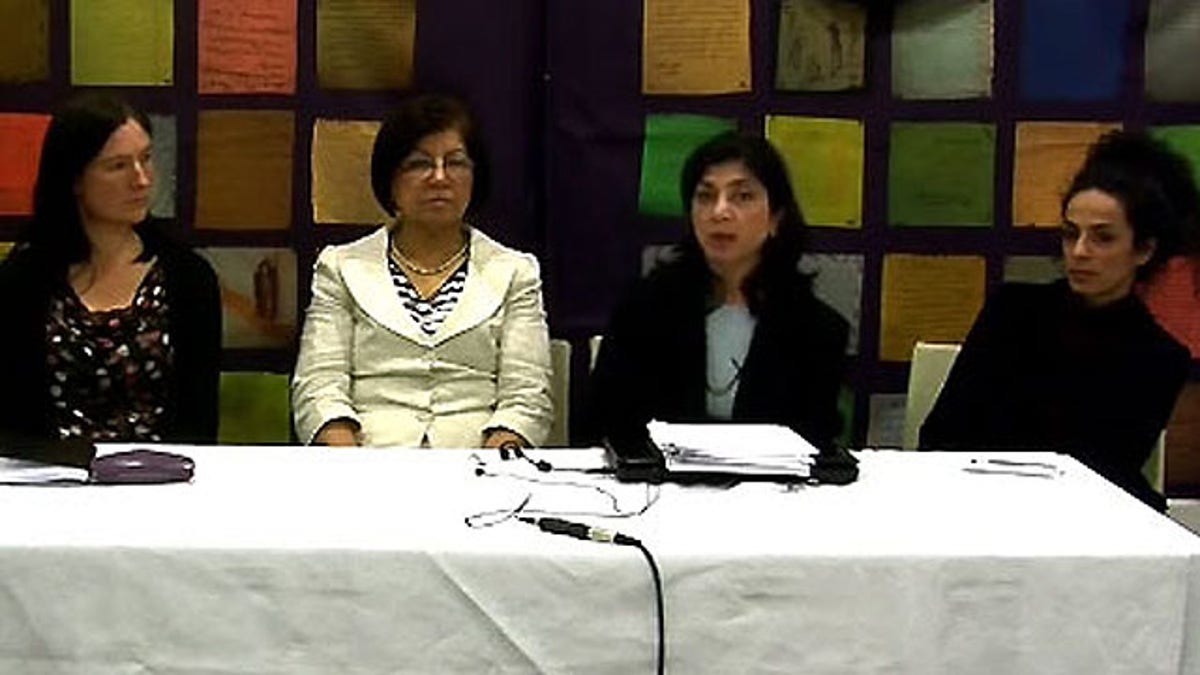
Panelists at last week's press conference discuss Iran's Family Protection Bill. From left: Ann Harrison, Amnesty International; Rouhi Shafii, International Coalition Against Violence in Iran; Roya Kashefi, Association des Chercheurs Iraniens; and journalist Masih Alinejad.
The Iranian government calls it the Family Protection Bill, but activists call it the “Anti-Family Protection Bill.”
It would give men the right to take a second wife without the permission of the first, and it would enshrine a man’s right to have an unlimited number of temporary marriages, which can last from 10 minutes to 99 years. Those arrangements come from Shariah law and have always existed in Iran, but the Family Protection Bill would make them official.
Two groups -- the International Coalition Against Violence in Iran, and the Association of Iranian Researchers -- arranged a press conference in London last week to raise awareness of the issue. Amid the upheaval in Iran right now -- the hardship associated with sanctions, and the political strife -- they question why such a law, which has been winding its way through Iran’s government for several years, even needs to be on the table.
Women opposed to the articles in the bill that pertain to polygamy went on a brave and creative odyssey more than a year ago to confront it, traveling around Iran to talk to women whose lives have been adversely affected by their husbands taking second wives.
The women wrote their stories on pieces of cloth; if they were illiterate, they had someone else write them down. Then they sewed the pieces together into a quilt.
The quilt is still in Iran, but a digital image was smuggled out.
“Most of the stories are from around Iran, not from Tehran. They are sad stories,” said Rouhi Shafii of the International Coalition Against Violence in Iran.
Here is a translation of one of the stories:
“A few years after my marriage, my husband started telling me, jokingly, that I looked like an old woman. I was five years younger than he. He began beating me and broke my hands several times. When he talked of taking up another wife, I took it as a joke. He wouldn’t do that, I thought. We have two children. But one day he married a young girl and wanted to get a two story building to bring his bride to live with us. I made him swear on the Koran not to do that, and he took his child bride elsewhere. He forgot about us and spent all his earning enjoying his bride. I was providing for the children by working at people’s homes or hairdressing salons. My younger son says: ‘when I grow up, I will kill my dad.’”
A group of women activists also gathered 15,000 signatures from women opposed to the law — signatures complete with their addresses. The activists brought the signatures and the quilt to Parliament last year, to try to stop the legalization of the polygamy articles as part of the new law. Parliament accepted the signatures, but would not take the quilt.
“It was a very brave act they did last year, in the middle of demonstrations and detentions,” Shafii told Fox News.
Many of the women involved in creating the quilt are out of Iran right now, but they were afraid to appear at the press conference, fearing the regime would make life hard for their families back home.
To many Iranian women, temporary marriage is tantamount to legalized prostitution. But the women’s opposition to the bill is not unanimous. Many female Members of Parliament are as conservative as the men, and they support the legislation.
At this point, the two articles of the bill that deal with polygamy are on hold, but they have not been canceled out of the bill. Shafii believes activism has kept those bills from being passed so far.
